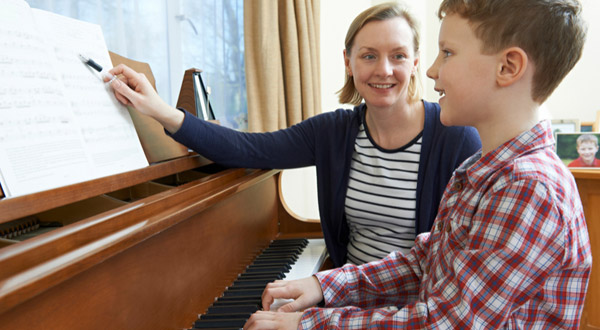For decades, pianists have been teaching piano at home, offering lessons to students in the comfort of their own abode. When it’s organized properly, home teaching is a win-win situation for both teacher and student, especially when the studio is set up correctly and lessons can proceed in an efficient and comfortable environment.
If you’ve thought about teaching piano lessons in your home, you’ve likely considered all the particulars. If not, you should be considering the following factors before you begin to advertise for students.
A Suitable Piano Studio Space
When you are planning how to start teaching piano lessons from home, the first consideration will need to be the physical space in which you will teach. Obviously, it will need to be a space that includes your piano. However, you may need to make some changes in your home before you start.
For example, if your piano is in your living room or den/family room, that may be a problem, especially if your own family will be home while you are teaching. Privacy and a good deal of peace and quiet is key, so you’ll want to locate a space where you can teach undisturbed. If you live alone, of course, that will be less of a problem.
Nonetheless, your students deserve a suitable space for lessons as well as your undivided attention, so plan accordingly. A room dedicated solely to music teaching is ideal but, understandably, not always possible. Nevertheless, do whatever is possible to create a space that is amenable to teaching and void of disturbances.
When preparing your home for the day’s lessons, it’s also a good idea to make sure your home is clean and tidy, and your bathroom sink has been wiped. Having a clean environment reflects well on your image as a piano teacher … and it’s a good excuse to schedule your housework before you begin teaching piano in your home each week!
Keep Regular Hours For Teaching Piano
In thinking about teaching piano lessons at home, you’ll also want to carefully consider your own personal calendar before you begin to advertise for students, especially if you plan to do this only part-time.
Lesson times must be consistent. Think of it like a time-share option. Students book a 30-, 45-, or 60-minute lesson time and that – essentially – becomes their real estate. For example, they might own Mondays at 4 pm, so every Monday at 4 in the afternoon, they’ll show up for their lesson. That should remain as such and both you and the student need to respect that time.
So, in order to be consistent, you should first determine how many hours per week you wish to spend teaching piano lessons and then block out that many hours according to your schedule and that of family members for whom you are responsible. (For example, if you have to take your daughter to dance lessons on Wednesdays at 6 pm, you shouldn’t book students at that time.)
Depending on how many hours you wish to teach, you might put all your hours on one day or spread them out over two or more. Remember, however, that prime teaching hours are from about 3 pm to 8 pm on weekdays and from about 9 am to noon on Saturdays. You’ll likely book lessons for children in the afterschool and early evening hours as well as on Saturday, but may be able to book adults into those later times.
If you have children of your own, be sure that you book teaching hours when someone else is available to keep an eye on your kids.
It’s also wise to book your piano lessons one after another. That is the most efficient use of your time and such scheduling also reminds students that if they are late for their lesson, you can’t extend it because you have another student immediately following their lesson.
Scheduling back-to-back piano lessons also makes you look busier (even if you’re just starting out), which will certainly impress your students!
A Sensible Payment Plan For Piano Lessons
At-home piano teachers who are most successful adopt a payment plan that requires the student to pay monthly (or quarterly, etc.) rather than weekly. This ensures that the student (or the student’s parents) are making a steadfast commitment and also makes it less likely that they will cancel at the drop of a hat, knowing that they could lose that week’s lesson (and their money!) if they bail out at the last minute.
A good bookkeeping program will be essential as well as help you organize your “teaching piano at home” project. Look at several programs that can help you keep students’ payments in order and choose the one you believe is most user-friendly and easy to understand. Accurate bookkeeping is essential for income reporting and tax responsibilities.
Have A Cancellation Policy For Your Piano Studio
In order to be successful at teaching piano at home, you MUST put forth a cancellation policy and stick to it. Your cancellation policy should also include a policy about booking make-up lessons and when that is an option.
Ideally, students should cancel at least 24 hours before their lesson. This allows you to use their relinquished time for make-up lessons for other students. If they DO NOT cancel within 24 hours (or whatever time span you choose), they will not be entitled to a make-up lesson.
If they adhere to the cancellation policy, you can make up their lesson at your convenience, which will hopefully be within the same week, though that isn’t always possible depending on the density of your schedule. If you cannot make up the lesson in a reasonable amount of time, you can choose to refund the student, though refunds should be a last resort.
Of course, things happen and people get sick or experience emergencies that take precedence over their piano lesson. At that point, you’ll need to make a decision as to whether you will schedule a make-up or, if necessary, offer a refund for the week or weeks missed by the student.
Most of all, you need to make all of this clear before you begin and might even consider having the student or parent sign a copy of a studio policy before lessons commence. It’s a piece of paper that will protect both of you and will clarify any misconceptions.
Remember, teaching piano is a business adventure not a hobby and should be treated as such. Organize your studio efficiently and you’ll find that teaching piano at home can provide you with plenty of extra cash as well as satisfaction in knowing that you’re sharing your gift of music with those who strive to learn.

